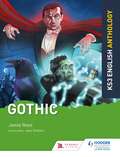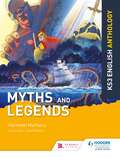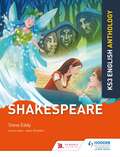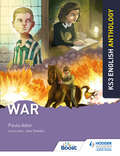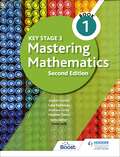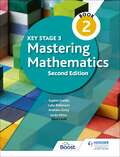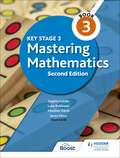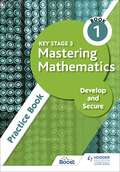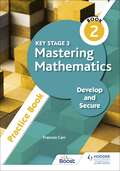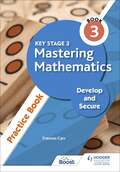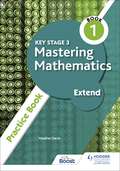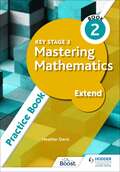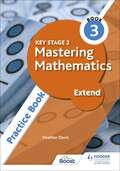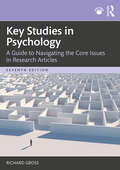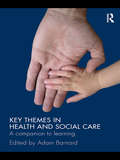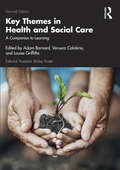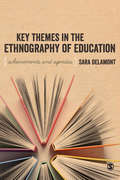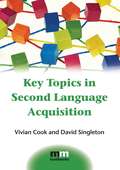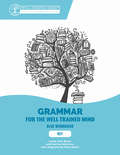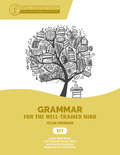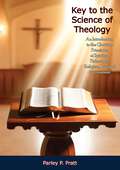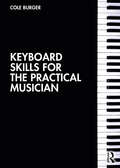- Table View
- List View
Key Stage 3 English Anthology: Gothic
by Jamie Rees Jane SheldonInspire your teaching with Key Stage 3 English Anthology: Gothic, a themed anthology for Year 8.Featuring texts full of suspense, horror and gloom such as Frankenstein and Dracula, this anthology guides students through fiction, non-fiction and poetry encouraging them to connect with a variety of texts to gain a thorough understanding of the context and literary techniques underpinning each piece of work.Each extract is supported by Teaching and Learning Resources, including quizzes, lesson plans and PowerPoint slides to help you implement the content of the book.Each extract includes:- A context panel to provide key information to set the scene of each extract- Glossaries and annotations to help students work through each extract confidently- Look closer: key questions for students to consider as they work through the extracts- Now try this: writing and speaking activities to encourage students to get creative and actively engage with the text- Fast finisher tasks to support students who race ahead- A practice question to familiarise students with the command words they will see at GCSE
Key Stage 3 English Anthology: Myths and Legends
by Harmeet MatharuInspire your teaching with Key Stage 3 English Anthology: Myths and Legends, a themed anthology for Year 7.Featuring myths such as The Odyssey and legends such as King Arthur, this Anthology guides students through fiction, non-fiction and poetry, encouraging them to connect with a variety of texts to gain a thorough understanding of the context and literary techniques underpinning each piece.Each extract is supported by Teaching and Learning Resources, including quizzes, lesson plans and PowerPoint slides to help you implement the content of the book.Each extract includes:- A context panel to provide key information to set the scene of each myth- Glossaries and annotations to help students work through each extract confidently- Look closer: key questions for students to consider as they work through the extracts- Now try this: writing and speaking activities to encourage students to get creative and actively engage with the text- Fast finisher tasks to support students who race ahead- A practice question to familiarise students with the command words they will see at GCSE
Key Stage 3 English Anthology: Myths and Legends
by Jane Sheldon Harmeet MatharuInspire your teaching with Key Stage 3 English Anthology: Myths and Legends, a themed anthology for Year 7.Featuring myths such as The Odyssey and legends such as King Arthur, this Anthology guides students through fiction, non-fiction and poetry, encouraging them to connect with a variety of texts to gain a thorough understanding of the context and literary techniques underpinning each piece.Each extract is supported by Teaching and Learning Resources, including quizzes, lesson plans and PowerPoint slides to help you implement the content of the book.Each extract includes:- A context panel to provide key information to set the scene of each myth- Glossaries and annotations to help students work through each extract confidently- Look closer: key questions for students to consider as they work through the extracts- Now try this: writing and speaking activities to encourage students to get creative and actively engage with the text- Fast finisher tasks to support students who race ahead- A practice question to familiarise students with the command words they will see at GCSE
Key Stage 3 English Anthology: Shakespeare
by Steve Eddy Jane SheldonInspire your teaching with Key Stage 3 English Anthology: Shakespeare, a themed anthology for Year 7 through to Year 9. Featuring key extracts from A Midsummer Night's Dream, Romeo and Juliet and Macbeth, the Anthology guides students through each play, encouraging them to engage with the text to gain a thorough understanding of the context and literary techniques underpinning Shakespeare's work. Each extract is supported by Teaching and Learning Resources, including quizzes, lesson plans and PowerPoint slides to help you implement the content of the book. Each extract includes:- A context panel to provide key information to set the scene of Elizabethan England- Glossaries and annotations to help students work through each extract confidently - Look closely: key questions for students to consider as they work through the extracts- Now try this: writing and speaking activities to encourage students to get creative and actively engage with the text- Fast finisher tasks to support students who race ahead- A practice question to familiarise students with the command words they will see at GCSE
Key Stage 3 English Anthology: Shakespeare
by Steve EddyInspire your teaching with Key Stage 3 English Anthology: Shakespeare, a themed anthology for Year 7 through to Year 9. Featuring key extracts from A Midsummer Night's Dream, Romeo and Juliet and Macbeth, the Anthology guides students through each play, encouraging them to engage with the text to gain a thorough understanding of the context and literary techniques underpinning Shakespeare's work. Each extract is supported by Teaching and Learning Resources, including quizzes, lesson plans and PowerPoint slides to help you implement the content of the book. Each extract includes:- A context panel to provide key information to set the scene of Elizabethan England- Glossaries and annotations to help students work through each extract confidently - Look closely: key questions for students to consider as they work through the extracts- Now try this: writing and speaking activities to encourage students to get creative and actively engage with the text- Fast finisher tasks to support students who race ahead- A practice question to familiarise students with the command words they will see at GCSE
Key Stage 3 English Anthology: War
by Paula AdairInspire your teaching with Key Stage 3 English Anthology: War, a themed anthology for Year 8.Featuring a moving mixture of poetry and prose, this Anthology guides students through a variety of extracts encouraging them to connect with the text to gain a thorough understanding of the context and literary techniques underpinning each piece of work.Each extract is supported by Teaching and Learning Resources, including quizzes, lesson plans and PowerPoint slides to help you implement the content of the book.Each extract includes:- A context panel to provide key information to set the scene of each extract- Glossaries and annotations to help students work through each extract confidently- Look closer: key questions for students to consider as they work through the extracts- Now try this: writing and speaking activities to encourage students to get creative and actively engage with the text- Fast finisher tasks to support students who race ahead- A practice question to familiarise students with the command words they will see at GCSE
Key Stage 3 English Anthology: War
by Paula AdairInspire your teaching with Key Stage 3 English Anthology: War, a themed anthology for Year 8.Featuring a moving mixture of poetry and prose, this Anthology guides students through a variety of extracts encouraging them to connect with the text to gain a thorough understanding of the context and literary techniques underpinning each piece of work.Each extract is supported by Teaching and Learning Resources, including quizzes, lesson plans and PowerPoint slides to help you implement the content of the book.Each extract includes:- A context panel to provide key information to set the scene of each extract- Glossaries and annotations to help students work through each extract confidently- Look closer: key questions for students to consider as they work through the extracts- Now try this: writing and speaking activities to encourage students to get creative and actively engage with the text- Fast finisher tasks to support students who race ahead- A practice question to familiarise students with the command words they will see at GCSE
Key Stage 3 Mastering Mathematics Book 1
by Sophie Goldie Luke RobinsonWith small steps and our carefully crafted questions, every pupil will achieve greater progress.Designed to be used flexibly, this second edition textbook has been updated to include more Mastery-style questions and whole-class activities. Whether you follow a full Mastery scheme, choose to use Mastery aspects or you're just looking for quality resources, our three textbooks support the way you want to teach.Each book gradually builds on prior knowledge, developing pupils' confidence, fluency, reasoning and problem-solving skills.· Secure understanding with differentiated questions and worked examples that build on prior knowledge, following the 'do it, secure it, deepen it' Mastery structure· Recap skills and topics from Key Stage 2, ensuring a smooth transition to Key Stage 3· Target key skills using the fluency, reasoning and problem-solving markers in the margin· Build confidence with starter activities and warm-up questions to introduce each concept· Develop reasoning skills using non-examples, where pupils identify mistakes in sample answers· Track progress through review questions, building key skills and knowledge· Benefit from the expertise of UK Mastery trained subject specialists with over 30 years of teaching experience· Cover the full UK National Curriculum and all four strands - number, algebra, geometry and measures, statistics and probability - within our three restructured textbooks for Key Stage 3Our flexible, Mastery-led approachOur flexible approach allows you to teach maths your way. You can choose to focus on building understanding using the graduated questions or take a Mastery approach to exposition using manipulatives and 'concrete, pictorial, abstract' in the optional class activities.Answers will be provided online.
Key Stage 3 Mastering Mathematics Book 2
by Sophie Goldie Luke Robinson Andrew GintyWith small steps and our carefully crafted questions, every pupil will achieve greater progress.Designed to be used flexibly, this second edition textbook has been updated to include more Mastery-style questions and whole-class activities. Whether you follow a full Mastery scheme, choose to use Mastery aspects or you're just looking for quality resources, our three textbooks support the way you want to teach.Each book gradually builds on prior knowledge, developing pupils' confidence, fluency, reasoning and problem-solving skills.· Secure understanding with differentiated questions and worked examples that build on prior knowledge, following the 'do it, secure it, deepen it' Mastery structure, building on prior knowledge from Book 1· Target key skills using the fluency, reasoning and problem-solving markers in the margin· Build confidence with starter activities and warm-up questions to introduce each concept· Develop reasoning skills using non-examples, where pupils identify mistakes in sample answers· Track progress through review questions, building key skills and knowledge· Benefit from the expertise of UK Mastery trained subject specialists with over 30 years of teaching experience· Cover the full UK National Curriculum and all four strands - number, algebra, geometry and measures, statistics and probability - within our three restructured textbooks for Key Stage 3Our flexible, Mastery-led approachOur flexible approach allows you to teach maths your way. You can choose to focus on building understanding using the graduated questions or take a Mastery approach to exposition using manipulatives and 'concrete, pictorial, abstract' in the optional class activities.Answers will be provided online.
Key Stage 3 Mastering Mathematics Book 3
by Heather Davis Sophie Goldie Luke RobinsonWith small steps and our carefully crafted questions, every pupil will achieve greater progress.Designed to be used flexibly, this second edition textbook has been updated to include more Mastery-style questions and whole-class activities. Whether you follow a full Mastery scheme, choose to use Mastery aspects or you're just looking for quality resources, our three textbooks support the way you want to teach.Each book gradually builds on prior knowledge, developing pupils' confidence, fluency, reasoning and problem-solving skills.· Secure understanding with differentiated questions and worked examples that follow the 'do it, secure it, deepen it' Mastery structure, building on prior knowledge from Book 2· Target key skills using the fluency, reasoning and problem-solving markers in the margin· Build confidence with starter activities and warm-up questions to introduce each concept· Develop reasoning skills using non-examples, where pupils identify mistakes in sample answers· Track progress through review questions, building key skills and knowledge so students will be prepared for the next step up to GCSE· Benefit from the expertise of UK Mastery trained subject specialists with over 30 years of teaching experience· Cover the full UK National Curriculum and all four strands - number, algebra, geometry and measures, statistics and probability - within our three restructured textbooks for Key Stage 3Our flexible, Mastery-led approachOur flexible approach allows you to teach maths your way. You can choose to focus on building understanding using the graduated questions or take a Mastery approach to exposition using manipulatives and 'concrete, pictorial, abstract' in the optional class activities.Answers will be provided online.
Key Stage 3 Mastering Mathematics Develop and Secure Practice Book 1
by Frances CarrBuild key fluency and reasoning skills and prepare for problem-solving with extra practice. This book is packed with questions that take small steps to enable sustained progress and is perfect for intervention.- Bridge the gap from KS2 to KS3 by recapping the key skills and content needed for KS3- Develop knowledge and understanding with practice questions that get progressively more difficult following a Mastery approach to learning- Support pupils with helpful reminders and explanations alongside hints for trickier questions- Help to engage pupils with questions that relate maths to outside of the classroom and plenty of colourful images- Enable home learning with answers available online
Key Stage 3 Mastering Mathematics Develop and Secure Practice Book 2
by Frances CarrBuild key fluency, reasoning and problem-solving skills with extra practice. This book is packed with questions that take small steps to enable sustained progress and is perfect for intervention.- Develop knowledge and understanding with practice questions that get progressively more difficult following a Mastery approach to learning- Support pupils with helpful reminders and explanations alongside hints for trickier questions- Help to engage pupils with questions that relate maths to outside of the classroom and plenty of colourful images- Enable home learning with answers available online
Key Stage 3 Mastering Mathematics Develop and Secure Practice Book 3
by Frances CarrBuild key fluency, reasoning and problem-solving skills with extra practice. This book is packed with questions that take small steps to enable sustained progress and is perfect for intervention.- Develop knowledge and understanding with practice questions that get progressively more difficult following a Mastery approach to learning- Support pupils with helpful reminders and explanations alongside hints for trickier questions- Help to engage pupils with questions that relate maths to outside of the classroom and plenty of colourful images- Enable home learning with answers available online
Key Stage 3 Mastering Mathematics Extend Practice Book 1
by Heather DavisStrengthen problem-solving skills and challenge more able pupils through extra practice. This book is packed with questions that are perfect for extension activities and learning beyond the curriculum.- Ensure sustained progress and greater depth for more able pupils with challenging practice questions designed to improve their fluency, reasoning and problem-solving skills- Follow a Mastery approach to learning with questions that get progressively more difficult through small steps - Promote conceptual understanding with questions that encourage pupils to apply and reflect on their knowledge- Enable home learning with answers available online
Key Stage 3 Mastering Mathematics Extend Practice Book 2
by Heather DavisStrengthen problem-solving skills and challenge more able pupils through extra practice. This book is packed with questions that are perfect for extension activities and learning beyond the curriculum.- Ensure sustained progress and greater depth for more able pupils with challenging practice questions designed to improve their fluency, reasoning and problem-solving skills- Follow a Mastery approach to learning with questions that get progressively more difficult through small steps - Promote conceptual understanding with questions that encourage pupils to apply and reflect on their knowledge- Enable home learning with answers available online
Key Stage 3 Mastering Mathematics Extend Practice Book 3
by Heather DavisStrengthen problem-solving skills and challenge more able pupils through extra practice. This book is packed with questions that are perfect for extension activities and learning beyond the curriculum.- Ensure sustained progress and greater depth for more able pupils with challenging practice questions designed to improve their fluency, reasoning and problem-solving skills- Follow a Mastery approach to learning with questions that get progressively more difficult through small steps - Promote conceptual understanding with questions that encourage pupils to apply and reflect on their knowledge- Enable home learning with answers available online
Key Studies in Psychology: A Guide to Navigating the Core Issues in Research Articles
by Richard GrossNow in its seventh edition, this book brings together 30 classic and contemporary studies in psychology to show students how to analyse key studies in the field, understand how classic theories are constantly revisited by modern researchers, and develop the skills required to write about psychology in exams and essays.Pulled from each of the five major areas of psychology – cognitive, developmental, individual differences, social, and biopsychology – the studies cover such topics as language and memory, attachment, mental disorder, bystander intervention, and near-death experiences. Each chapter looks at the background and context to a classic and contemporary study and provides a summary of them, before going on to evaluate areas of agreement and convergence, disagreement and divergence, and strengths and weaknesses. Each of these areas focuses on theoretical, methodological/statistical, and ethical issues. Finally, suggestions are made regarding applications, implications, and future research directions. In so doing, the book helps students learn how to deal with primary sources, including how to extract the most relevant information, assess strengths and weaknesses, know what to look for when evaluating a study, and understand how it relates to other research.Bridging the gap from A-level to degree level study, this is the ideal resource for undergraduate students in psychology.
Key Themes in Health and Social Care: A Companion to Learning
by Adam BarnardKey Themes in Health and Social Care is a learning resource for students in health and social care. It provides an overview of foundational issues and core themes in the field and introduces key areas of debate, moving from an introductory level to in-depth discussion as the book progresses. Divided into three parts: the first part sets the scene, addressing introductory psychology and sociology, social policy, equality and diversity, skills for practice, and working with people the second part considers key themes such as the contribution of philosophy and politics; criminal justice; management of services; the relationship between place and wellbeing; research in health and social care; theories of counselling; housing and the built environment the third part looks at discrete areas of practice such as mental health; substance abuse, protection work; health promotion; disability studies; working with men; child welfare and public responsibility. Each chapter begins with an outline of the content and learning outcomes and includes reflective exercises to allow students to reflect on what they have read, review their learning and consolidate their understanding. Time-pressed readers wanting to ‘dip into’ the book for relevant areas can do so but, read from cover to cover, the book provides a comprehensive introduction to the key areas of contemporary health and social care practice. It will be particularly helpful for students undertaking health and social care undergraduate and foundation degrees.
Key Themes in Health and Social Care: A Companion to Learning
by Adam Barnard Verusca Calabria Louise GriffithsThis revised and expanded second edition of Key Themes in Health and Social Care is a learning resource for students in health and social care. It provides an overview of foundational issues and core themes in the field and introduces key areas of debate, moving from an introductory level to in-depth discussion as the book progresses. Divided into three parts: the first part sets the scene, addressing introductory psychology and sociology, social policy, equality and diversity, skills for practice, and working with people the second part considers key themes such as mental health and wellbeing; management of services; the relationship between place and wellbeing; research in health and social care; and person-centred interventions the third part looks at discrete areas of practice such as mental health; ageing, leading and managing health and social care; working with vulnerable populations; and health promotion Each chapter begins with an outline of the content and learning outcomes and includes reflective exercises to allow students to reflect on what they have read, review their learning and consolidate their understanding. Time-pressed readers wanting to ‘dip into’ the book for relevant areas can do so but, read from cover to cover, the book provides a comprehensive introduction to the key areas of contemporary health and social care practice. It will be particularly helpful for students undertaking health and social care undergraduate and foundation degrees.
Key Themes in the Ethnography of Education (BSA New Horizons in Sociology)
by Dr Sara Delamont"This is a beautifully written book that takes the reader to the heart of ethnography as experience. Readers can walk in the shoes of ethnographers who have travelled before them, and learn as they learned. Sara Delamont is an undisputed expert in both ethnography and education, and here illustrates she is also a tour de force in writing style. All the important ingredients for a recipe to make a good quality ethnography are here, and they are served up with relish!" - Karen O'Reilly, Loughborough University "This is a powerful, richly nuanced, evocative work; a stunning and brilliantly innovative intervention. It provides ground zero - the starting place for the next generation of social scholars of education. A major accomplishment." - Norman K. Denzin, University of Illinois at Urbana-Champaign The ethnography of education has been conducted by sociologists and anthropologists, largely in self-contained and self-referential ways. This book celebrates the continuities and the strengths of ethnographic research on education in formal and non-formal settings, deliberately transgressing the sociology/anthropology divide. Education is broadly defined to cover many settings other than schools, in many countries, for many age-groups. The book is structured thematically, including chapters on movement and mobilities, memorials and memories, time and timescapes, bodies, and performativities, multi-sensory research, and narratives. Strategies for designing innovative ethnographic projects, and for fighting familiarity are provided.
Key Topics in Second Language Acquisition
by Vivian Cook David SingletonThis textbook offers an introductory overview of eight hotly-debated topics in second language acquisition research. It offers a glimpse of how SLA researchers have tried to answer common questions about second language acquisition rather than being a comprehensive introduction to SLA research. Each chapter comprises an introductory discussion of the issues involved and suggestions for further reading and study. The reader is asked to consider the issues based on their own experiences, thus allowing them to compare their own intuitions and experiences with established research findings and gain an understanding of methodology. The topics are treated independently so that they can be read in any order that interests the reader.
Key to Blue Workbook: A Complete Course For Young Writers, Aspiring Rhetoricians, And Anyone Else Who Needs To Understand How English Works (Grammar for the Well-Trained Mind #9)
by Susan Wise BauerThe Key to the Blue Workbook gives clear, thoroughly-explained answers to all exercises in the Blue Workbook, one of four workbooks in the Grammar for the Well-Trained Mind series, providing detailed, well-designed exercises in the correct use of English grammar. The Key to the Blue Workbook gives clear, thoroughly-explained answers to all exercises in the Blue Workbook, one of four non-sequential books in the Grammar for the Well-Trained Mind series, providing detailed, well-designed exercises in the correct use of English grammar. The Key, along with the accompanying Blue Workbook and the Core Instructor Text, make up Grammar for the Well-Trained Mind: a complete course that takes students from basic definitions (“A noun is the name of a person, place, thing, or idea”) through advanced sentence structure and analysis, all the grammar skills needed to write and speak with eloquence and confidence. This innovative program combines the three essential elements of language learning: understanding and memorizing rules (prescriptive teaching), repeated exposure to examples of how those rules are used (descriptive instruction), and practice using those rules in exercises and in writing (practical experience). Each year, parents and teachers go through the dialogue, rules, and examples in the Core Instructor Text; students follow along in the Workbook. This repetition solidifies the concepts, definitions, and examples in the student’s mind. There are four Workbooks, one for each year. Each Workbook contains the same rules and examples, but four completely different sets of exercises and assignments, allowing students to develop a wide-ranging knowledge of how the rules and examples are put to use in writing. Each Key to the Workbooks provides not only answers, but also explanations for the parent/instructor, and guidance as to when the answers might be ambiguous (as, in English, they often are). All of the rules covered, along with the repeated examples for each, are assembled for ongoing reference in the Comprehensive Handbook of Rules (soon to be renamed as The Grammar Guidebook). Every step of the sentence diagramming process is gathered for reference, along with illustrations, in The Diagramming Dictionary. These will become the student’s indispensable guide to writing through high school, into college and beyond. Step-by-step instruction takes students from the most basic concepts through advanced grammatical concepts such as modal and hortative verbs and multiple functions of noun clauses. Extensive diagramming exercises reinforce the rules and help technical and visual learners to understand and use the English language effectively. Each step of the diagramming process is illustrated and thoroughly explained to the student. Text for examples and exercises are drawn from great works of literature, as well as from well-written nonfiction texts in science, mathematics, and the social sciences. Regular review is built into each year of work. The Key accompanies one of four non-sequential workbooks, each containing new exercises that allow students to practice and apply the grammar principles under study.
Key to Yellow Workbook: A Complete Course For Young Writers, Aspiring Rhetoricians, And Anyone Else Who Needs To Understand How English Works (Grammar for the Well-Trained Mind #0)
by Susan Wise Bauer Audrey Anderson Jessica OttoThe Key to Yellow Workbook gives clear, thoroughly-explained answers to all exercises in the Yellow Workbook, one of four non-sequential workbooks in the Grammar for the Well-Trained Mind series, providing detailed, well-designed exercises in the correct use of English grammar for middle-school and high-school level students, as well as grammar aficionados of any age. The Key to Yellow Workbook gives clear, thoroughly-explained answers to all exercises in the Yellow Workbook, one of four non-sequential books in the Grammar for the Well-Trained Mind series, providing detailed, well-designed exercises in the correct use of English grammar. The Key, along with the accompanying Yellow Workbook and the Core Instructor Text, make up Grammar for the Well-Trained Mind: a complete course that takes students from basic definitions (“A noun is the name of a person, place, thing, or idea”) through advanced sentence structure and analysis, all the grammar skills needed to write and speak with eloquence and confidence. This innovative program combines the three essential elements of language learning: understanding and memorizing rules (prescriptive teaching), repeated exposure to examples of how those rules are used (descriptive instruction), and practice using those rules in exercises and in writing (practical experience). Each year, parents and teachers go through the dialogue, rules, and examples in the Core Instructor Text; students follow along in the Workbook. This repetition solidifies the concepts, definitions, and examples in the student’s mind. There are four Workbooks, one for each year. Each Workbook contains the same rules and examples, but four completely different sets of exercises and assignments, allowing students to develop a wide-ranging knowledge of how the rules and examples are put to use in writing. Each Key to the Workbooks provides not only answers, but also explanations for the parent/instructor, and guidance as to when the answers might be ambiguous (as, in English, they often are). All of the rules covered, along with the repeated examples for each, are assembled for ongoing reference in The Grammar Guidebook. Every step of the sentence diagramming process is gathered for reference, along with illustrations, in The Diagramming Dictionary. These will become the student’s indispensable guide to writing through high school, into college and beyond. Step-by-step instruction takes students from the most basic concepts through advanced grammatical concepts such as modal and hortative verbs and multiple functions of noun clauses. Extensive diagramming exercises reinforce the rules and help technical and visual learners to understand and use the English language effectively. Each step of the diagramming process is illustrated and thoroughly explained to the student. Text for examples and exercises are drawn from great works of literature, as well as from well-written nonfiction texts in science, mathematics, and the social sciences. Regular review is built into each year of work. The Key accompanies one of four non-sequential workbooks, each containing new exercises that allow students to practice and apply the grammar principles under study.
Key to the Science of Theology: An Introduction to the Christian Principles of Spiritual Philosophy, Religion, Law and Government
by Parley P. PrattKey to the Science of Theology by Parley P. Pratt is a seminal work that offers a unique and comprehensive exploration of theology from a Latter-day Saint (LDS) perspective. Originally published in 1855, the book reflects Pratt’s pioneering vision of theology not merely as a system of faith but as a science—a discipline governed by divine laws and eternal truths. A leading figure in early Mormonism, Pratt presents a bold synthesis of philosophy, religion, and governance, aiming to illuminate the deeper principles that govern both spiritual and temporal realms.In this work, Pratt discusses key Christian doctrines, including the nature of God, the role of Jesus Christ, the importance of revelation, and the eternal potential of humanity. He emphasizes the idea that spiritual knowledge is acquired through obedience to divine laws, portraying theology as a living, dynamic pursuit of truth. Pratt also addresses themes such as the resurrection, spiritual gifts, the afterlife, and the eternal progression of souls, offering a profound vision of the purpose of human existence.Beyond theology, Pratt’s writings extend into practical matters of law and government, reflecting the Mormon belief in the integration of spiritual principles with societal order. He argues that true religion encompasses all aspects of life—personal, communal, and governmental—each governed by eternal laws that promote peace, justice, and freedom.Key to the Science of Theology remains a thought-provoking text for those interested in the relationship between faith and reason. Pratt’s innovative blend of theology and philosophy challenges readers to see religion as a pursuit of knowledge governed by universal truths. For students of LDS theology, philosophy, or religious thought, this work offers a fascinating insight into the early development of Mormon beliefs and the visionary spirit that continues to shape the faith today.
Keyboard Skills for the Practical Musician
by Cole BurgerKeyboard Skills for the Practical Musician provides undergraduate music majors in class piano courses with the techniques and fundamentals they need to flourish into independent, versatile musicians who play with confidence and sensitivity. Organized by skill (rather than level), the topics sequenced in this textbook offer endless flexibility for instructors while guiding students in a step-by-step approach through the development of essential keyboard skills ? such as reading, harmonization, improvisation, and accompaniment ? supporting concepts learned in music theory, ear training, private lessons, methods classes, and ensemble courses. One can draw from many sections of the book in any given class or semester, covering a wide range of piano skills that foster abilities frequently used in a myriad of musical professions.Features: • Over 400 sightreading, transposition, and score reading examples, along with 125 harmonization Melodies• Project assignments that promote independent learning, expose students to new musical styles, and encourage collaboration • A concluding Repertoire section with lists of solo and duet music, 10 ensemble arrangements, 6 duets, and additional pieces from the Baroque, Classical, Romantic, and Post-Romantic eras • Music examples include numerous works by composers from marginalized backgrounds and from global folk music• No prior piano background knowledge neededExplaining the core elements of keyboard learning in an accessible and responsive format while accentuating the importance of learning how to learn, Keyboard Skills for the Practical Musician offers an essential resource for all class piano students and instructors.
